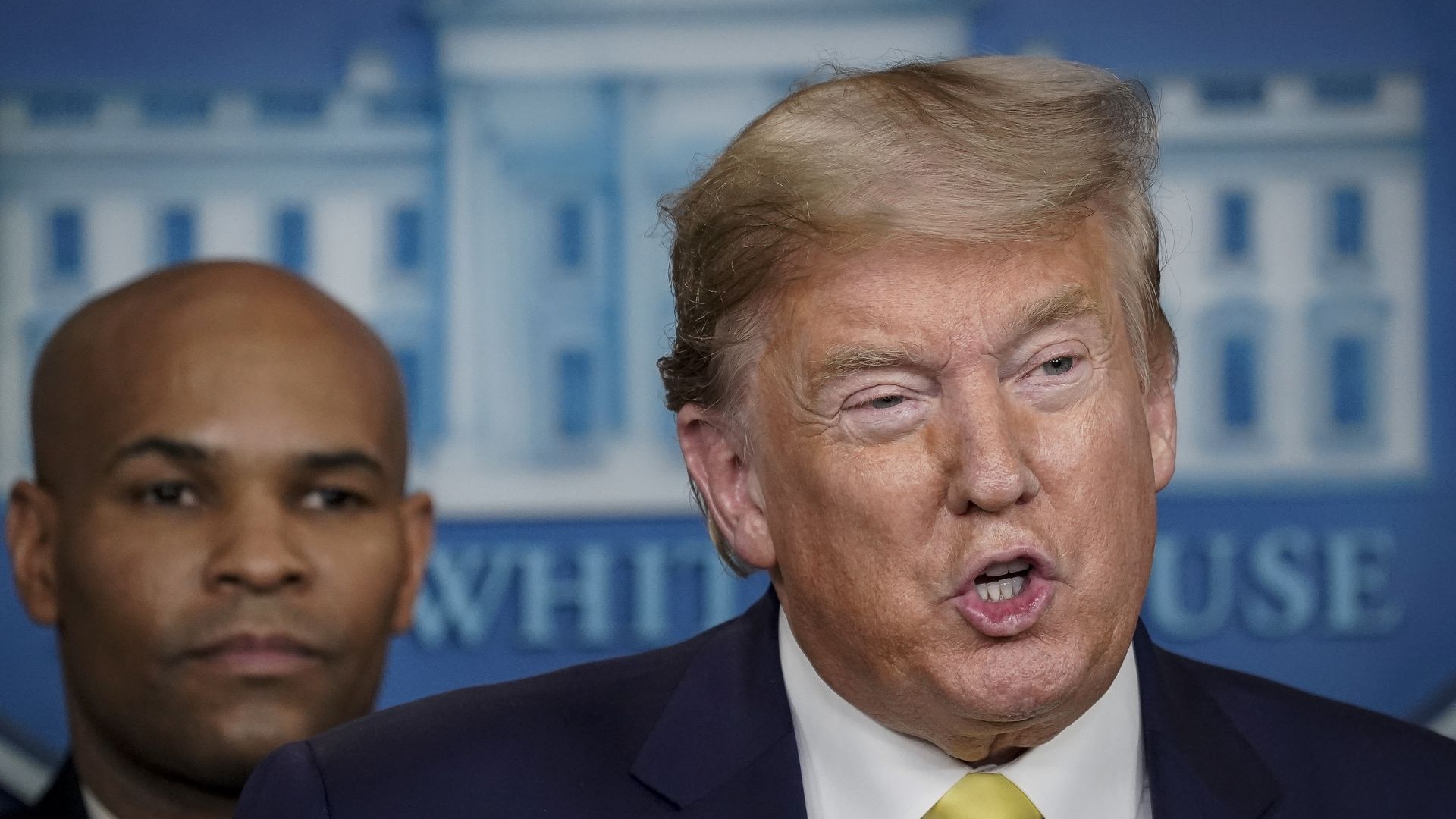The trade war could weaken U.S. coronavirus response
Add Axios as your preferred source to
see more of our stories on Google.

U.S. Surgeon General Jerome Adams looks on as President Donald Trump speaks during a press briefing with the White House Coronavirus Task Force. Photo: Drew Angerer/Getty Images.
As the Trump administration mulls its plan to battle the impact of COVID-19 on the U.S. economy, scant attention has been given to a major source of potential stimulus: reining in its tariffs on China.
Why it matters: U.S. tariffs increase costs for American companies that import Chinese goods, and with fewer customers making purchases as the COVID-19 outbreak slows demand, the trade war "is going to be a bigger drag on the economy," Chad P. Bown, a senior fellow at the Peterson Institute for International Economics (PIIE), tells Axios.chevron.
- The U.S. still has most of its tariffs in place on $360 billion worth of Chinese imports after the phase one trade deal it signed in mid-January.
The big picture: President Trump's trade war sent the U.S. manufacturing and transportation industries into a recession in 2019, and the coronavirus outbreak this year has further damaged global trade.
- While the trade war is no longer the top concern, if U.S. tariffs on China are left in place, the recoveries of the U.S., Chinese and world economies will likely all be slower and weaker.
Background: The Trump administration has provided tariff exceptions for certain medical products like masks and gloves, but Treasury Secretary Steven Mnuchin told a House committee last week the White House was "not considering" removing Chinese tariffs but would "look at all the options that we think are important to help."
- That hasn't sparked much hope for a change in course.
What we're hearing: "Given how slow publicly they’ve been to just react to ... the public health problems with the coronavirus, I’m not optimistic that they’re going to see the linkages to the trade war and make the connection," Bown says.
- The trade war "is an important political thing for [Trump], and I’m not optimistic they’re going to want to be seen to change the terms despite it obviously being problematic for the U.S. economy."
Between the lines: Aditya Bhave, senior global economist at Bank of America Securities, pointed out in a recent note to clients that the impact of uncertainty shocks, like the trade war, "tend to be lagged, large and long-lasting."
- Weak data early this year from Southeast Asia and the eurozone "suggest that trade-war related disruptions continued to weigh on growth,” he adds.
- China is the major hub of the world's supply chain and the epicenter of the coronavirus outbreak, and the speed at which it can get its industry back up and running is paramount for the country, its trading partners and the United States.
Another group that would be greatly helped by a rollback in tariffs is farmers and the U.S. agriculture sector, which last year saw farm debt rise to record levels and bankruptcies increase 20%.
- The industry was banking on the phase one deal's commitment of a $200 billion increase in purchases from China, which was in doubt when the agreement was signed and now looks even less likely.
Flashback: Trump has provided $28 billion in bailout funding for farmers and last year 40% of U.S. farm income came from trade assistance. That funding has expired.Reality check: "Most observers believed that the ag sector was hurt and would need an extraordinary year to make up for that. I don’t think they’re going to see it," Mary Lovely, a senior fellow at PIIE and economics professor at Syracuse, tells Axios.
- "Couple that with the fact that the U.S. could very possibly be heading towards a recession, and it’s going to be a tough year for them."
Go deeper: The next dominoes in the coronavirus economy
